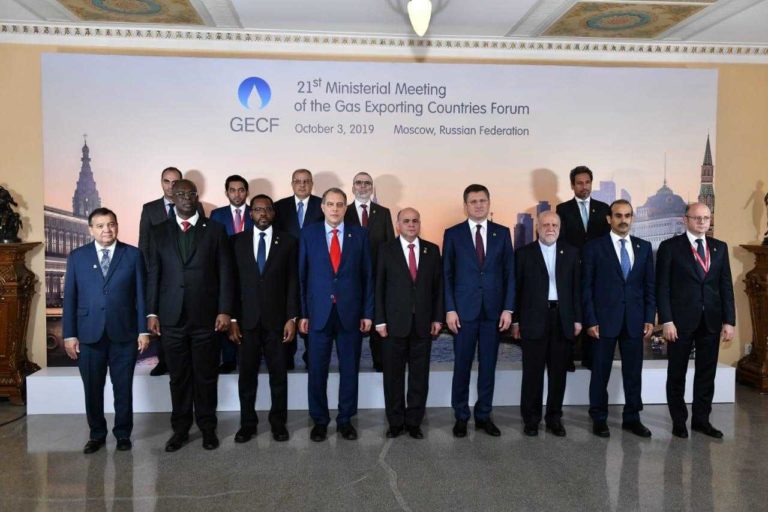The 21st Ministerial Meeting of Gas Exporting Countries commenced on Thursday in Moscow, Russia under the Chairmanship of Manuel Salvador Quevedo Fernandez, Power Minister of Petroleum of the Bolivarian Republic of Venezuela.
The Meeting was attended by official delegations from Algeria, Bolivia, Egypt, Equatorial Guinea, Iran, Libya, Nigeria, Qatar, Russia, Trinidad and Tobago, United Arab Emirates, Venezuela, Azerbaijan, Oman, headed by Ministers and high-level officials. The Chairman of the Executive Board and the Secretary General attended the meeting.
Manuel Quevedo, the President of the Ministerial Meeting, HE Alexander Novak, Energy Minister of the host country, and HE Yury Sentyurin, GECF Secretary General delivered the opening remarks, reaffirming the leading position natural gas currently occupies in many countries, and its significant yet locked potential in regard to the transition towards less carbon intensive energy systems.
In this context, the GECF Member Countries repeatedly underlined their commitment to the principles of sustainable development, enhancing cooperation and development in research, technology, information exchange, knowledge transfer, and the sharing of best practices.
The Ministerial Meeting expressed its deep concern about the extra-territorial application of laws and regulations, as well as an objection to unilateral economic sanctions in the gas sector, and particularly against GECF Member Countries.
The Ministers discussed the current situation of the gas market and expressed their concerns about the challenges the gas industry is facing in terms of geopolitical tensions weakening world economic growth; and the uncertainty of energy policies and economic sanctions against some GECF Member Countries that prevents them from unlocking their huge potential of natural gas resources. The current gas and LNG developments were also discussed as well as their implications on GECF Member Countries.
The Russian Energy Minister noted that 2018 was an exceptional year for growth for the natural gas industry with consumption recording a 5% growth, the fastest growth since 2010, to average 3.95 Tcm. The trade in 2018 was also characterized by a significant growth where global pipeline gas trade increased by almost 8%, including re-export operations in Europe. LNG trade growth continued exponentially with 10% for the second consecutive year, averaging a level of around 320 Mt.
The Global Gas Outlook 2050 was considered by Ministers. Based on the granular GECF Global Gas model, it projects that natural gas increases its share in the global energy mix, from 23% today to 27% in 2050, thus displacing other sources of energy in many sectors. For the first time the scope of modelling features two brand-new alternative scenarios are considered: the carbon offset compensation scenario and the blue hydrogen scenario, both reflecting the importance of addressing the challenges posed by climate change.
The Ministers re-emphasized the importance of access of the poor to modern energy services, as well as socio-economic development and the protection of the environment, and reaffirmed their resolve to pursue the advancement of natural gas as an affordable, accessible, reliable and clean source of energy, and its essential role in achieving the Sustainable Development Goals.
In this connection, the Ministerial Meeting praised the efforts of the Secretariat towards enhancing the role of the GECF as an Observer Intergovernmental Organization to the United Nations Framework Convention on Climate Change, fulfilling its objective of promoting natural gas as a fuel of choice, given its environmental credentials, and of designing an environmental actions framework.
As it was highlighted in the GECF Secretariat’s report, in 2019 for the first time ever the Forum was invited to present its expertise at the G20 Ministerial Meeting on Energy Transitions and Global Environment for Sustainable Growth; and to become a member of the Energy Transition Working Group under G20. In this context, natural gas furthers sustainable development, being an attractive combination of environmental sustainability and economic viability, which is reflected in the enriched 2019 editions of Annual Short Term Gas Market Report and Statistical Bulletin, represented at the Meeting.
The Ministerial Meeting reiterated the importance of technology cooperation and re-emphasized the crucial role of the Gas Research Institute, established in Algeria, to this end. It has also noted that the GRI Scientific Committee has already considered no less than 29 projects submitted by member countries.
Underlining the importance of dialogue, a core principle of the GECF, the need for data transparency in the market was addressed with a focus on the importance of GECF participation in JODI-Gas, the joint program of IEA-IEF-OPEC on energy outlooks, the Oxford Institute for Energy Studies program as well as other peer energy organizations.
Upon the completion of the first term of tenure of incumbent Secretary General, the Ministers decided to extend the term of GECF Secretary General Dr. Yury Sentyurin for a period of two years starting from January 2020.
In accordance with the decision declared in the 2017 Summit in Santa Cruz de la Sierra, Bolivia – the 5th Summit of GECF Heads of State and Government will be hosted in Malabo, the Republic of Equatorial Guinea, the Ministerial Meeting reviewed the preparations for the Forum’s flagship event taking place this November. Furthermore, it was decided that the 22nd Ministerial Meeting of the GECF will convene in November 2020 in Algeria.
The Ministers and Heads of delegation expressed their appreciation to HE Alexander Novak, Minister of Energy of the Russian Federation, for the warm hospitality and excellent arrangements made for the Meeting.














